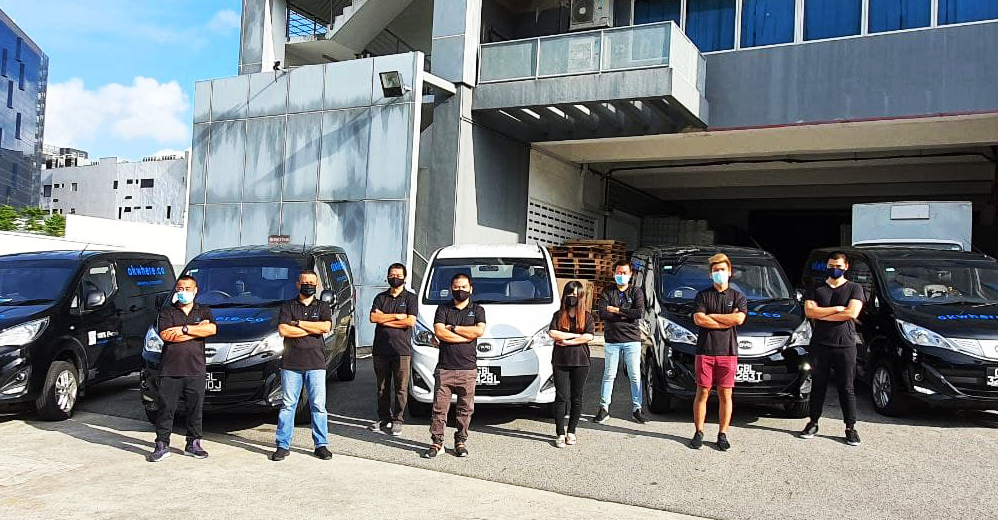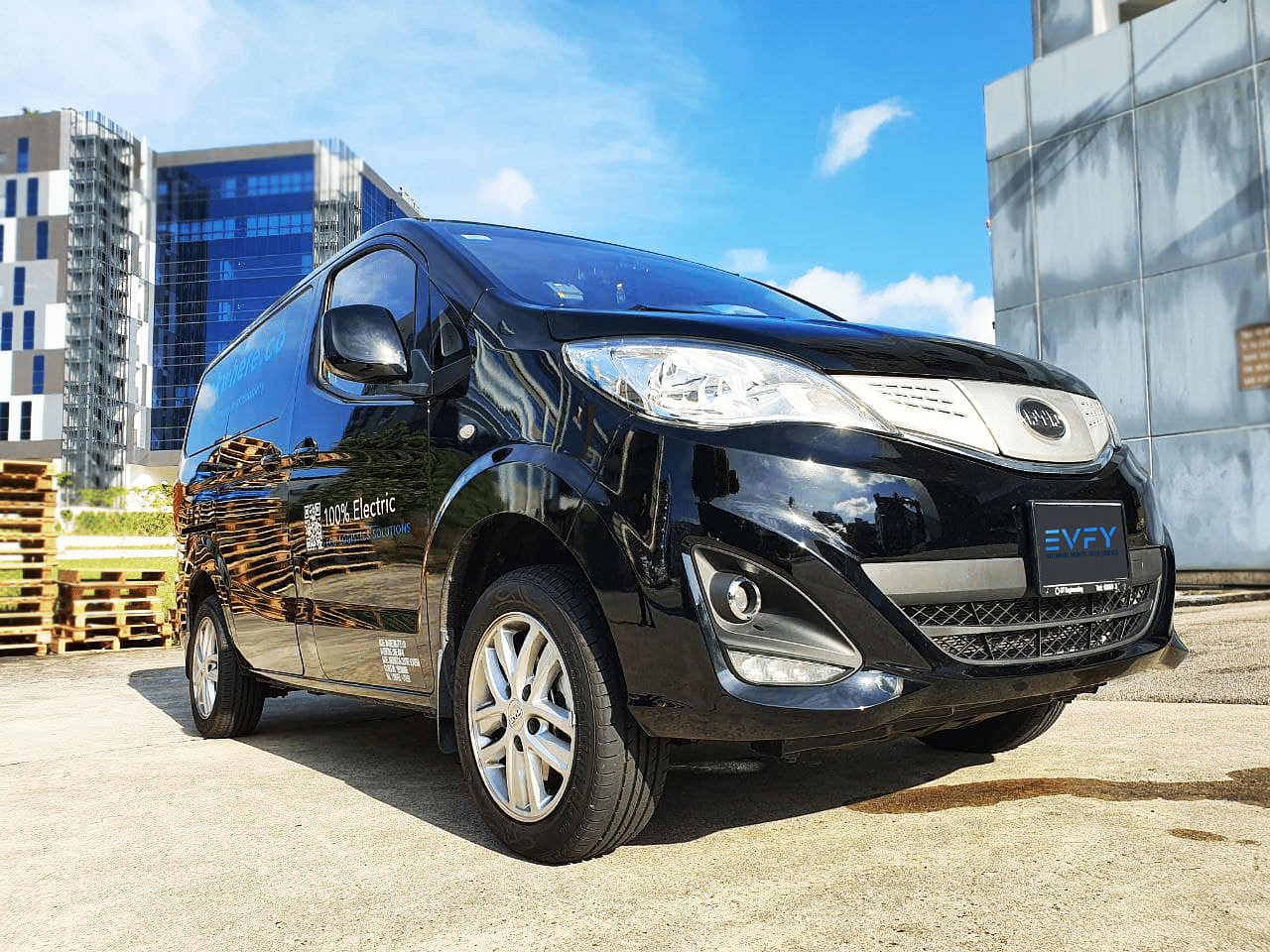BRANDED CONTENT
This logistics start-up helps companies shrink carbon footprint with electric vehicles, green warehousing and more
Evfy, formed through merger of GetVan and OkWhere, is plugging gaps in the last-mile delivery sector as Singapore transitions to a green economy

Evfy, a home-grown logistics start-up, and its operations team (above), run a fleet of electric vehicles to help companies reduce their carbon footprint. PHOTOS: EVFY
As the Mid-Autumn Festival approaches, Evfy's BYD T3 vans are picking up mooncakes from retailers to be delivered to customers islandwide. Some of these businesses are becoming more conscious of their carbon footprint. Thankfully, they found a like-minded partner in the home-grown start-up.
According to a report by the World Economic Forum, the use of electric vehicles for last-mile delivery will cut carbon emissions by 24 per cent.
Evfy is a new entity formed recently through the merger of two logistics companies - GetVan and OkWhere. The new firm aims to provide customers with more sustainable options for their last-mile deliveries through its fleet of seven electric vehicles. It plans to grow the fleet over time, in line with Singapore's plans to phase out petrol and diesel vehicles by 2040. Evfy is also looking at establishing a fleet of electric bikes to further hone its last-mile delivery capabilities.

"More businesses are turning towards green and sustainable solutions, along with global efforts to reduce carbon footprint," says Mr Mark Wang, chief executive officer of Evfy. "Our clients are eco-conscious, making a decision to use electric vehicles for their last-mile deliveries as they see the long-term benefits of a net-zero carbon future and potential cost savings."
As consumers in Singapore and globally take to online shopping and food deliveries during the pandemic, the environmental impact of such deliveries cannot be underestimated.
Urban last-mile delivery emissions are on track to increase by more than 30 per cent by 2030 in the top 100 cities globally (by population) if nothing is done about them, according to the World Economic Forum (WEF). But with ecosystem-wide change, interventions could reduce emissions - and traffic congestion - by 30 per cent, and delivery cost by 25 per cent, compared with the "do-nothing" scenario, said the WEF study released last year.
By offering Singapore's first 100 per cent in-house electric vehicle delivery fleet, Evfy wants to play a part in creating a sustainable last-mile logistics ecosystem for Singapore. This will, in turn, contribute to the meeting of green targets set out in the Singapore Green Plan 2030.
Among other things, the whole-of-government approach requires all new car and taxi registrations be of cleaner-energy models from 2030 and provide 60,000 charging points for electric vehicles nationwide that year.
"Evfy is making the first move to make our delivery fleet entirely based on clean energy to provide the option for eco-conscious businesses that actively seek to mitigate the impact of carbon footprint for future generations, locally and globally," says Mr Wang. He cited the starkest warning issued by the Intergovernmental Panel on Climate Change on Aug 9 that called for rapid and drastic reductions in greenhouse gases in this decade to avert climate catastrophe.
While Evfy is a relative newcomer to the logistics sector, it pulls together the experience and resources of its two predecessors to offer a suite of end-to-end green solutions to the customers. Other than a full in-house electric vehicle fleet, the firm is also able to tap a network of 600 on-demand drivers formerly registered with GetVan.
It also boasts a proprietary logistics technology system that can help optimise delivery routes as well as manage warehousing needs in a more sustainable manner. Furthermore, customers can make use of the green warehouse located in Genting Lane, formerly managed by OkWhere, where the facilities are powered by solar energy, instead of electricity from the national grid.
Evfy also provides green packaging options such as biodegradable packs.
The firm recently closed a round of funding and raised an undisclosed amount of funds from established venture firms such as Brain-Too-Free Ventures, Moovaz, Axxel Marketing, as well as a few angel investors.
In the next two years, Evfy plans to expand its leasing arm, which leases out electric vehicles to drivers and add at least another green warehouse to its offerings.
"We envision building a strong network of sustainable last-mile logistics solutions through leasing partners and an in-house driver fleet. We aim to convert every driver partner on our platform to drive an electric vehicle by 2030," says Mr Wang.
Mr Alex Teo, chief executive officer of Ollo Lifestyle International, says Evfy's green proposition is the biggest draw for his company, which provides laundry services to hotels and hospitals.
"It has always been one of our values to provide sustainability solutions to our wide range of customers," says Mr Teo, adding that Evfy is one such partner that shares the firm's vision.
"Going green is not just for ourselves but for the many generations after us," Mr Teo adds.
Despite challenges posed by the ongoing pandemic, the Internet economy in South-east Asia has hit US$100 billion (approximately S$136 billion) in 2020 and it is on track to reach US$300 billion in the next five years, according to a report by Google, Temasek and consulting firm Bain & Company.
Mr Wang, having been in the e-commerce sector since 2004, said the pandemic has catalysed a second boom for online shopping in Singapore. He expects Evfy's growth to double annually over the next five years.
As more infrastructure and policies are being rolled out to help Singapore meet its green targets, Mr Wang predicts that more businesses will start pivoting to more sustainable solutions such as turning to electric vehicles for last-mile delivery. Consumers, too, are expecting that companies wear sustainability on their sleeve.
"The public will come to realise that going green is going to have a big impact on our daily lives and future generations," Mr Wang adds.
For more information on how you can leverage a green delivery fleet to reduce your carbon footprint, visit www.evfy.sg.



